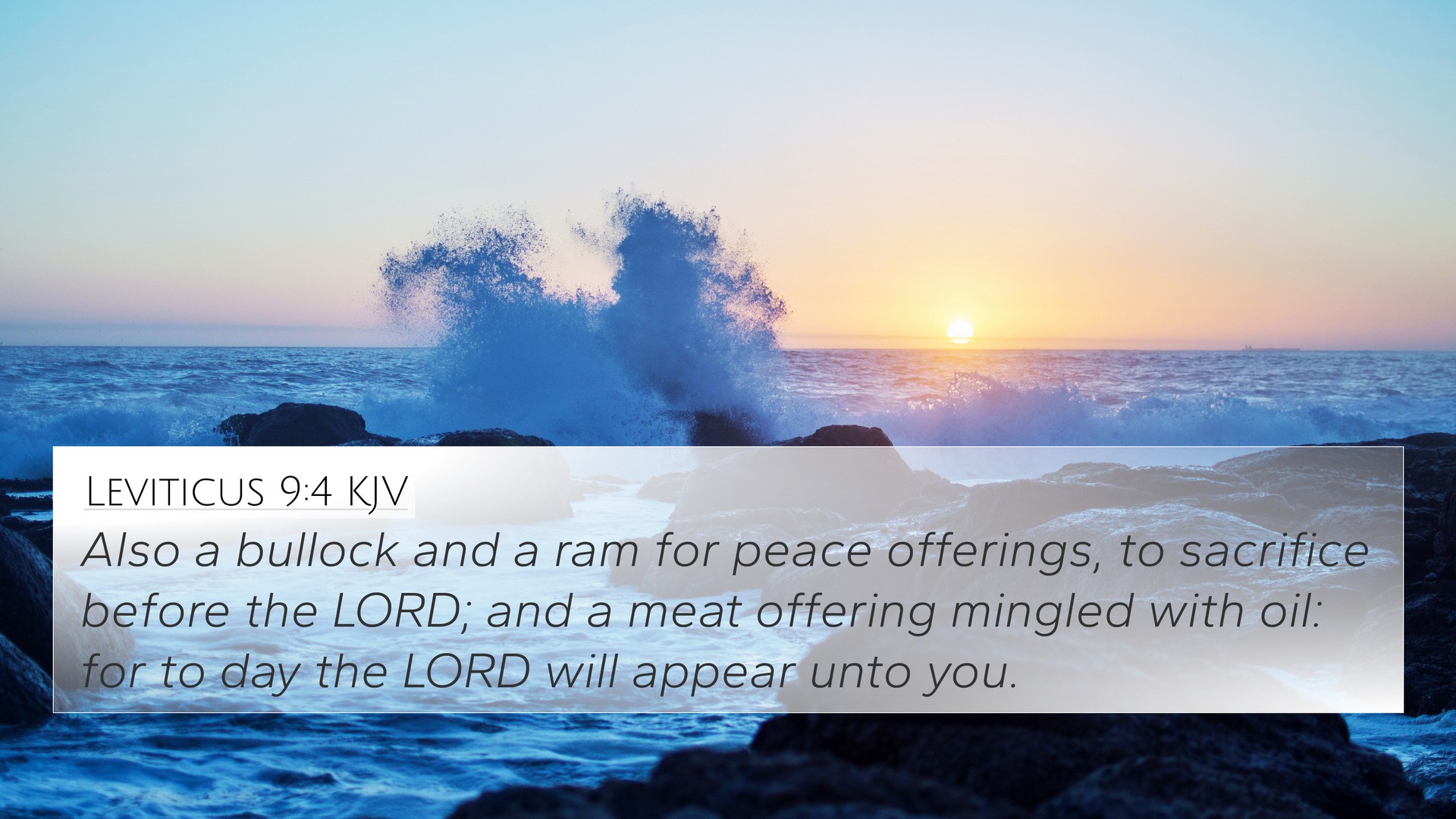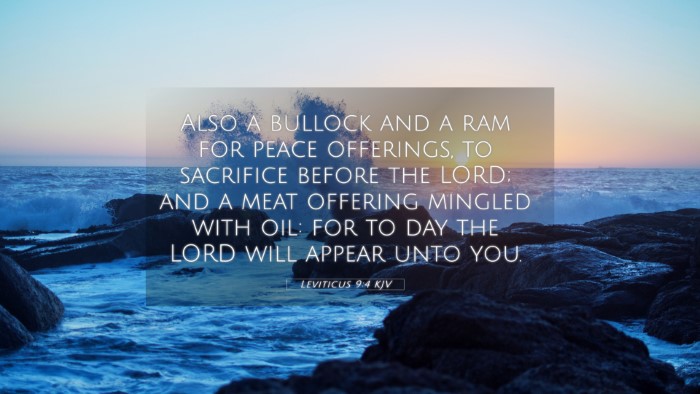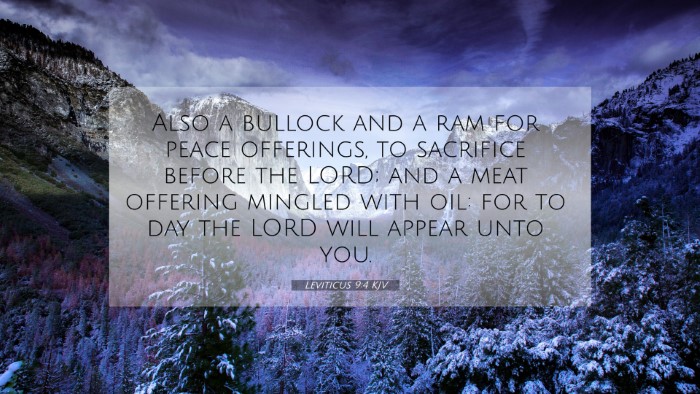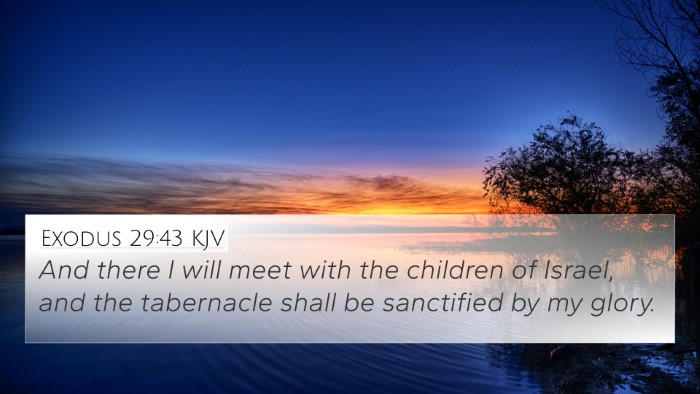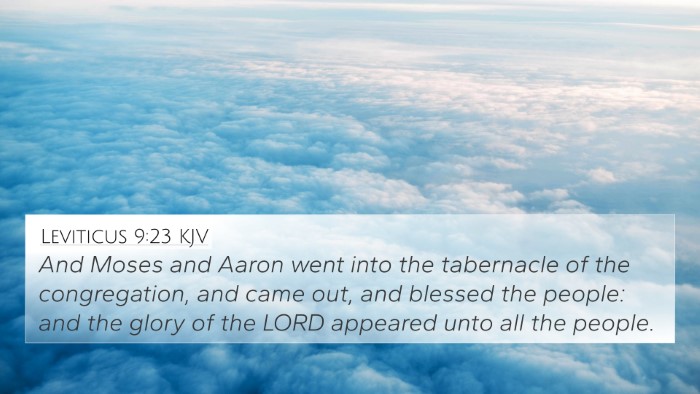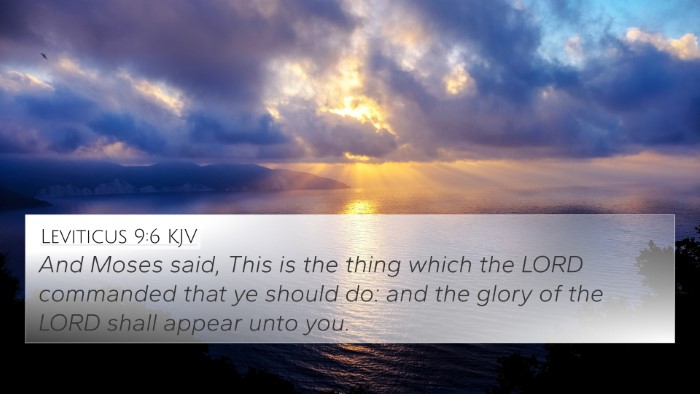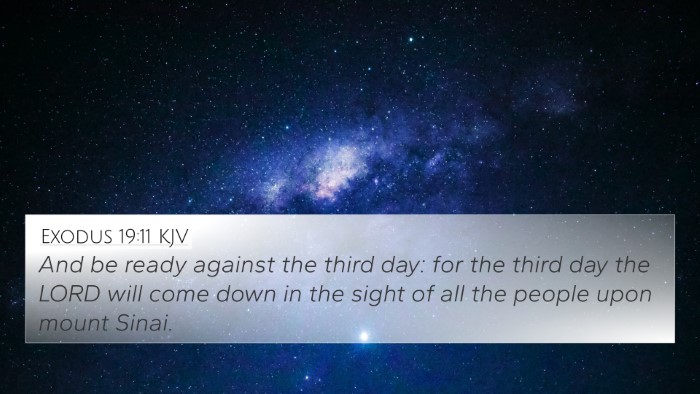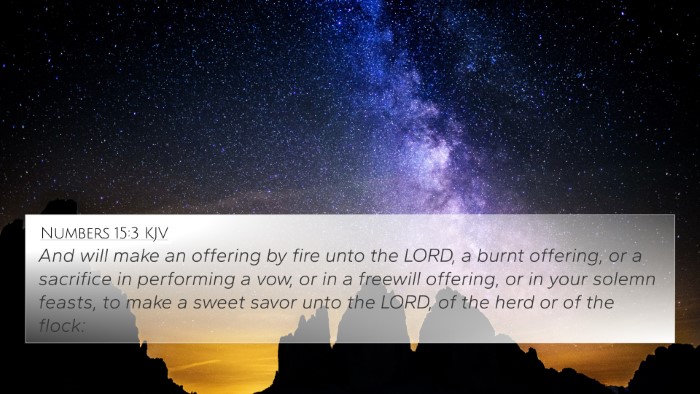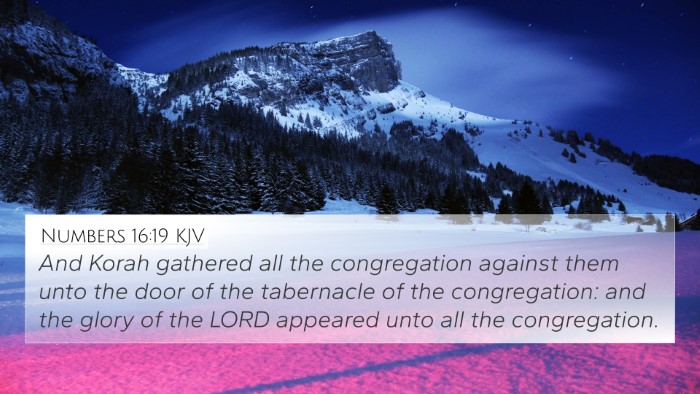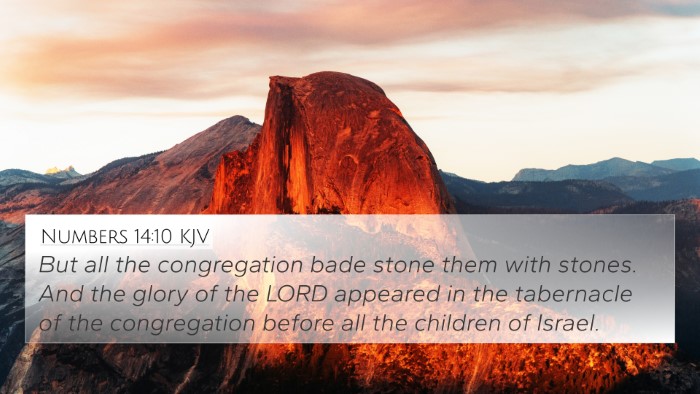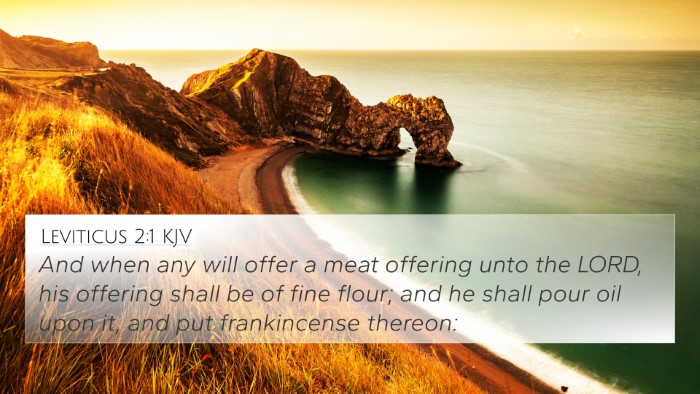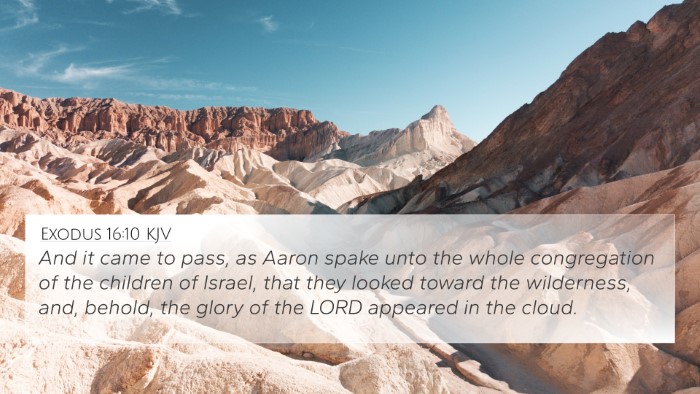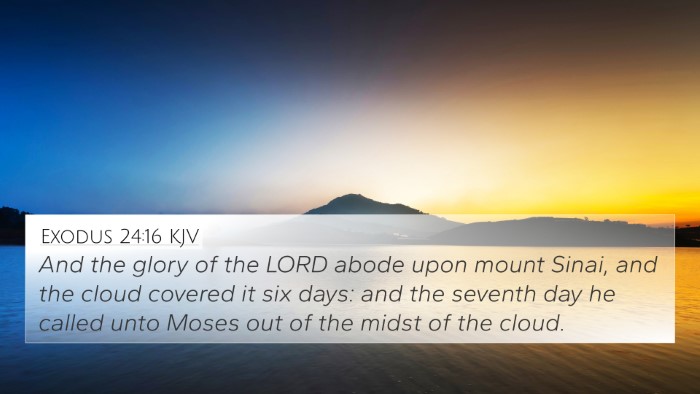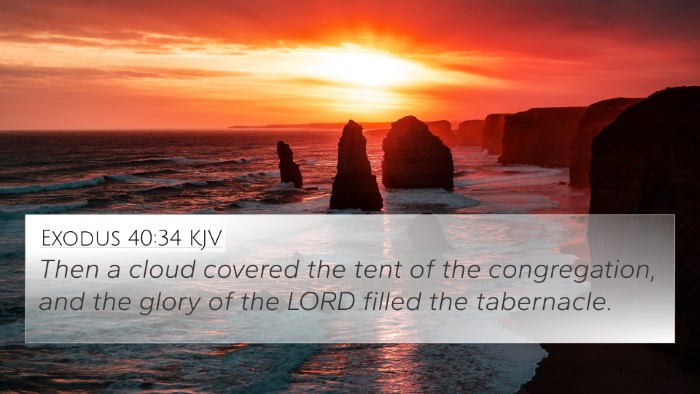Understanding Leviticus 9:4
Leviticus 9:4 states: "Also a bullock and a ram for peace offerings, to sacrifice before the Lord; and a meat offering mingled with oil: for today the Lord will appear unto you." This verse is a pivotal moment in the establishment of the priesthood, highlighting the importance of sacrificial offerings in worship. Below is a comprehensive analysis of its meaning based on public domain commentaries, drawing from insights provided by Matthew Henry, Albert Barnes, and Adam Clarke.
Commentary Insights
Matthew Henry's Commentary
Matthew Henry emphasizes that this verse marks a significant point in the consecration of Aaron and his sons as priests. The offerings represent not just acts of worship but also symbolize reconciliation between God and His people. The bullock serves as a sin offering, acknowledging human fallibility, while the ram serves as a peace offering, denoting restoration and gratitude towards God. The phrase "the Lord will appear unto you" reinforces the expectation of divine presence, a comforting assurance for the people.
Albert Barnes' Commentary
Albert Barnes interprets this moment as instructive for understanding sacrificial practices. He highlights that the bullock and ram were essential components of the Israelite worship system, reinforcing communal relationships with God. The inclusion of a meat offering mingled with oil signifies the sustenance of God's people, indicating an important connection to both material and spiritual nourishment. Barnes also notes that such offerings were a way to commemorate significant events in Israel's history, reminding them of God’s continual guidance.
Adam Clarke's Commentary
Adam Clarke offers depth in explaining the significance of peace offerings in this context, associating them with celebration and fellowship with God. The peace offering is a communal meal shared with the priest, turning the act of sacrifice into a shared encounter with the divine, thereby fostering a deeper relationship with God within the community. Clarke remarks on the necessity of proper intentions behind these offerings, indicating that the heart's posture in worship is just as critical as the physical act of sacrifice itself.
Bible Cross-References
Leviticus 9:4 connects with several important scriptures, enhancing the understanding of its themes:
- Exodus 20:24: "An altar of earth thou shalt make unto me, and shalt sacrifice thereon thy burnt offerings, and thy peace offerings..." – highlights the significance of sacrifice.
- Leviticus 3:1: "And if his oblation be a sacrifice of peace offering..." – relates to the peace offerings mentioned in Leviticus 9:4.
- Hebrews 9:22: "And almost all things are by the law purged with blood; and without shedding of blood is no remission." – establishes the theological underpinning of sacrifices.
- Numbers 6:14: "And he shall offer his offering unto the Lord, one he lamb of the first year without blemish for a burnt offering..." – supports the principles of offerings.
- Psalm 50:5: "Gather my saints together unto me; those that have made a covenant with me by sacrifice." – expresses the relationship between God and His people through sacrificial acts.
- 1 Peter 2:5: "Ye also, as lively stones, are built up a spiritual house, an holy priesthood, to offer up spiritual sacrifices..." – drawing a parallel to priestly duties.
- Romans 12:1: "I beseech you therefore, brethren, by the mercies of God, that ye present your bodies a living sacrifice, holy, acceptable unto God..." – relates the concept of sacrifice to New Testament believers.
- Isaiah 53:10: "Yet it pleased the Lord to bruise him; he hath put him to grief..." – connects the theme of sacrifice with prophetic implications regarding Christ.
- Malachi 1:11: "For from the rising of the sun even unto the going down of the same my name shall be great among the Gentiles..." – signifies the continuity of sacrifices beyond Israel.
- John 10:11: "I am the good shepherd: the good shepherd giveth his life for the sheep." – reflects Christ as the ultimate sacrifice, linking to the sacrificial system of the Old Testament.
Thematic Connections
The verse establishes important themes within the biblical narrative such as:
- Divine Presence: The expectation of God's appearance in worship emphasizes the sacred nature of the offerings.
- Community and Fellowship: The peace offering indicates a communal relationship among the Israelites, and with God.
- Reconciliation: The act of offering sacrifices serves as a means of restoring the relationship between God and Israel.
- Obedience: Following divine instructions regarding sacrifices demonstrates fidelity to God's commands.
- Symbolism: Each type of offering carries significant meaning reflecting theological insights into atonement and communion with God.
Conclusion
Leviticus 9:4 serves as a crucial link in the larger narrative of the Bible, showing how the ancient practices of worship resonate with themes of sacrifice, communal relationships, and the nature of divine encounters. Through comprehensive Bible verse analysis and cross-referencing scriptural texts, believers can deepen their understanding of these sacred practices that ultimately point toward a greater revelation in Christ.
Tools for Further Study
For those looking to delve deeper into the connections between Bible verses, utilizing a bible concordance or a bible cross-reference guide can illuminate these thematic ties. Moreover, engaging in cross-reference Bible study and utilizing bible reference resources can enhance your understanding of the scriptures and their interwoven messages.
